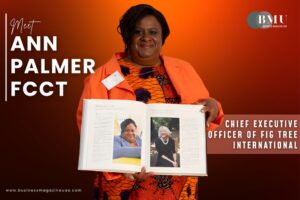
We recently had the privilege of interviewing Jumana Saeh, a strategic leader with over 25 years of experience in insurance and banking. Throughout her career, she has led teams, developed products, and built strong partnerships across life and general insurance. Jumana’s work has focused on practical, customer-focused solutions and delivering results through collaboration and innovation. Her leadership is grounded in experience, clear direction, and a deep understanding of the industry.
Spark Behind the Journey
We started the interview by asking, “What inspired you to build a career in the takaful and insurance sector, and what keeps you motivated today?”
Jumana Saeh shared, “Honestly, it wasn’t something I planned. I was working in corporate banking at the time when I happened to meet someone who introduced me to an opportunity in takaful. Out of curiosity, I started reading more about life takaful products—and that’s when it really clicked for me. I was drawn to the concept, especially how these products help people plan financially while also protecting their families during difficult times.
What started as a chance encounter turned into something I genuinely believe in. What keeps me going is knowing that the work we do truly makes a difference in people’s lives. We’re not just offering financial solutions—we’re offering peace of mind, support, and a sense of security when it matters most. That’s a powerful reason to stay motivated every day.”
Career-Defining Experiences of Jumana Saeh
Interested to learn more about her career journey, we asked Jumana Saeh to share a pivotal moment in her journey within the bancassurance space that significantly influenced her perspective or approach?
“Yes, definitely. One of the moments that really shifted my perspective was seeing firsthand the contrast between claims that were paid and those that were rejected—especially when rejections were due to non-disclosure or lack of proper declaration. In many cases, this came down to either the way the product was sold or the customer not fully understanding what they were signing up for. And unfortunately, we don’t usually think about these things until it’s too late—when a claim is needed.
That experience pushed me to dig deeper into the advisory side of the business. I went on to study the CII financial advisory course and started personally training sales teams. It added pressure to my role, but I felt a strong sense of responsibility to raise awareness and improve how we engage with customers. I genuinely believe this industry is underrated and often misunderstood—especially in our culture—so if I can play a small part in changing that narrative, then it’s worth the extra effort,” she mentioned.
Values Guiding a Visionary Leader
To lead successfully in any field, values play a crucial role. We further asked, “What personal value or principle has most shaped how you lead and work in the financial services industry?”
Jumana Saeh explained, “For me, it’s always been about responsibility. When you’re dealing with people’s financial futures—especially something as personal as protection for their families—you have to take that seriously. I’ve always believed that trust is earned through honesty, consistency, and doing the right thing, even when no one’s watching.
This sense of responsibility shows up in how I lead as well. I try to create a space where my team feels supported but also accountable—because the work we do really matters. At the end of the day, if a customer feels seen, heard, and protected, then we’ve done our job right. That mindset keeps me grounded and guides how I show up every day.”
An Impactful Project
We further asked, “Looking back, is there a project or initiative within the takaful or bancassurance sector that had a lasting impact on you personally?”
Jumana Saeh responded, “Yes, one initiative that really stayed with me was working on individual pension schemes. It made me realize just how often people delay thinking about retirement until it’s almost too late. We tend to focus so much on the present that long-term planning—especially for retirement—is often overlooked.
Through that project, I saw how powerful early planning can be. The earlier someone starts, the more control they have over sustaining their living standards later in life. It also highlighted some of the gaps we have in our region when it comes to awareness and preparation around this topic. That experience pushed me to become more vocal about financial literacy and to encourage clients—and even colleagues—to think long-term, not just about saving, but about truly protecting their future quality of life.”
Adaptability Amidst Digital Transformation
With technology reshaping customer expectations and delivery in the insurance landscape—particularly AI, we asked Jumana Saeh to share her opinion on its role.
“AI is playing a huge role across every level of the insurance value chain. It’s not just about automation anymore—it’s about using data intelligently to design better products, support underwriting decisions, and even streamline claims management. What excites me most is how AI is helping us understand customers more deeply by analyzing their behaviors, needs, and lifestyle patterns.
With that insight, we can offer more personalized solutions—products that actually fit a customer’s life, not just a one-size-fits-all policy. It’s changing the way we think about customer engagement too. Expectations are shifting, and AI gives us the tools to meet those expectations faster, smarter, and more meaningfully,” she reflected.
Lessons Learnt throughout the Journey
Interested in understanding Jumana Saeh’s learnings from the challenges in her journey, we posed the question, “What’s a recent challenge you’ve navigated in your professional journey, and what did it teach you?”
Jumana Saeh replied, “A major challenge across the industry has been adapting to the evolving regulatory landscape in the bancassurance space. These changes reflect a growing emphasis on transparency, market conduct, and ensuring that customers are offered products that genuinely suit their needs. While such shifts can initially feel disruptive, they’re a response to increasing market awareness and a broader demand for responsible financial practices.
As an industry, it’s no longer enough to simply adapt to change—we have to use it as a chance to do better. This means moving beyond product-push strategies and toward more consultative, needs-based selling. The real opportunity lies in raising the bar for how we engage with customers, ensuring we’re helping them make informed choices that align with their financial goals.”
Evolving as a Leader
We also asked Jumana’s view on the qualities that it takes to be a resilient and forward-thinking leader in today’s fast-changing financial environment.
Jumana Saeh stated, “For me, resilience starts with being adaptable. The financial landscape is changing faster than ever—whether it’s technology, regulations, or customer expectations. As a leader, you need to be open to change, not resist it. That means being willing to rethink old ways of working, stay curious, and continuously learn. It also means leading with a mindset that embraces uncertainty.
You won’t always have the perfect plan, but if you stay focused on your purpose and keep your team aligned with clear values, you can move forward with confidence. More than anything, I think it’s about being human—listening, supporting others, and staying grounded while still pushing for progress. That’s what helps you lead not just through change, but ahead of it.”
Driving a Positive Change in the Industry
We ended the session by asking, “If you could drive one meaningful change in the takaful or broader insurance industry, what would it be—and why?”
“I think it really comes down to two things: educating customers and raising the standard of how we sell. On the customer side, we still see a lot of people buying policies without fully understanding what they’re getting—or why they need it. If we can focus more on financial education and awareness, we’ll help people make better choices that actually fit their lives and goals.
At the same time, we also need to look inward—at how sales teams are trained and monitored. It’s not just about meeting targets anymore. We need to make sure the advice being given is responsible, ethical, and truly focused on the customer. Having clearer expectations and some kind of structure to monitor both performance and approach would go a long way. If we can get both sides right—the customer understanding and the staff conduct—I think we’ll build a stronger, more trusted industry,” Jumana added.
Follow Jumana Saeh on LinkedIn.
Also Read :-
Connecting People with Authentic and Unfiltered Narratives: Abeer Nammari







